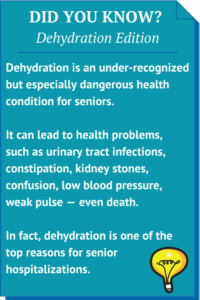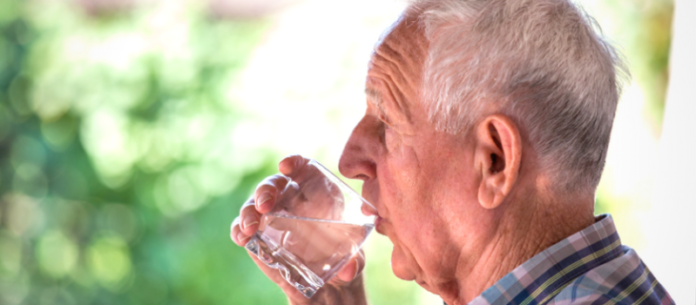Dehydration is a common and potentially dangerous health issue for seniors. According to the Agency for Healthcare Research and Quality, seniors over 65 have the highest hospitalization rates for admission due to dehydration. It is estimated that up to 40% of seniors and elders living in retirement and nursing homes are chronically underhydrated! This chronic state of underhydration leaves seniors more susceptible to infection from UTI’s to Pneumonia and other upper respiratory infections. Besides, dehydration can contribute to an increased risk for falls and even cognitive impairment.
Why Do Older Adults Struggle with Staying Hydrated?
Unfortunately, as we age, our body’s built-in mechanisms to help us avoid dehydration start break down. Here are just a few of the contributing factors in senior dehydration:
Lack of thirst
As we age, our sense of thirst decreases. We are less likely to have or notice a dry mouth, so we don’t feel the need to drink as much.
Mobility and incontinence problems
Even seniors with slight mobility impairments have difficulty making it to the bathroom as quickly as they once did. Add to that the all-too-common incontinence issues that increase as we age, and you can easily see why they might want to decrease their fluid intake.
Unable to get their own drinks
When seniors live in a nursing home or other type of senior community, their access to beverages may depend on the staff’s availability and attentiveness.
Coffee, Tea, Alcohol
Many seniors may not realize that beverages with caffeine and alcohol don’t count as “fluid intake.” They actually increase the need for water because of their diuretic effects.
Medications
Common medications prescribed to seniors can act as a diuretic and increase sweating in older adults.
 What Does Dehydration in Seniors Look Like?
What Does Dehydration in Seniors Look Like?
Great question! It’s not always easy to tell. Many of the signs of dehydration are similar to other conditions that the elderly commonly have. However, it’s important to be aware of the signs so that you can help make hydration a priority for your loved one.
Signs of Dehydration
- Increased mobility issues – difficulty walking (especially upon waking)
- Less skin elasticity – lightly pinch the skin on the back of the hand, if it doesn’t bounce back right away, offer more liquids
- Dry or cracked lips or skin, sunken eyes
- Frequent headaches, dizziness, or confusion
- Dark, smelly urine or constipation
What Can I Do to Help Prevent Dehydration?
Dietitians recommend seniors intake 2 liters (9 8-oz. glasses) of fluid each day, but caregivers know this is easier said than done. Being creative, flexible, and attentive is the best approach.
Here are a few ideas that can help you increase a loved one’s fluid intake:
- Drink throughout the day and make fluids easily accessible with a water bottle readily available. Cut back on fluids before bed to allay fears of incontinence.
- Drink the entire glass of water (or liquid) when taking medication and have at least one full glass of liquids with each meal and snack.
- Eat more water-rich foods with meals or as snacks. Fruits and vegetables, such as cucumbers, tomatoes, beets, carrots, honeydew, watermelon, cantaloupe, and celery, contain 80 to 98 percent water.
- Make drinking easier. Some seniors may require straws or cups with handles to drink. Make sure these items are available and within reach.
- Try liquids at different temperatures. Seniors may prefer hot tea, warm milk, Popsicles, or iced coffee.
- Limit caffeinated beverages. There are great premade iced tea options at the grocery store that are decaf and sugar-free. If you have a dedicated coffee drinker on your hands – see if they can switch to decaf iced coffee after their morning “wake-up” cup.
- Add in electrolytes! Coconut water comes in many flavors now and is high in electrolytes. There are also electrolyte-infused waters. Fruit juices like Cherry, watermelon, and orange juice are also high in electrolytes. They can be diluted with plain coconut water to decrease the amount of sugar.
- Keep cool in the summer. Stay out of the sun between 10 am and 4 pm.
Are you worried a loved one is not taking care of themselves and could use a little extra support? Give our care team a call. We would love to explore how in-home care can extend senior independence and offer the whole family peace-of-mind. 615-422-7549



















